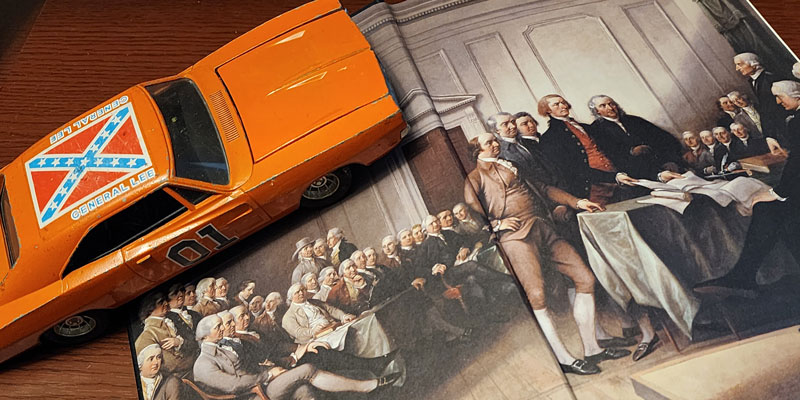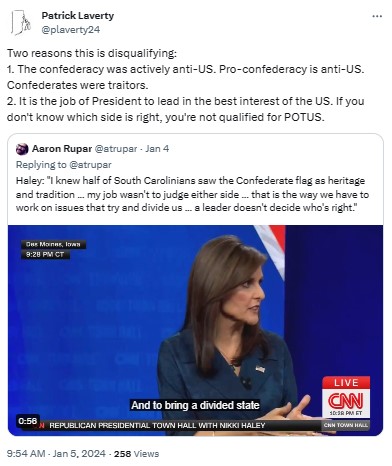
The Confederate Flag and Irony
By political design (one suspects), discussion of American history has lost something recently. People commonly suggest it’s been “dumbed down,” but that’s not the definitive change. Rather, it has lost the principles of liberty and mutual respect. I have in mind this tweet from one-time Anchor Rising contributor Patrick Laverty:

Knowing and respecting Patrick, I’d insist it would be too easy to conclude that he’s being disingenuous with his first point. Nonetheless, follow the link and watch the video clip. Haley didn’t say it wasn’t her job to decide whether the Confederacy was wrong in its time. She was saying that, in her time as South Carolina governor a century and a half later, a large portion of the people whom she was elected to represent “saw the Confederate flag as heritage and tradition.”
You can like it or not, but symbols change over time. For an illustration of this fact, spend some time tracing common sayings and symbols back to their origin and then listen for them in casual conversation. You’re bound to overhear soccer moms with children at their knees using phrases they’d never utter in front of minors if anybody still associated them with the gross or offensive images they once represented. Just imagine the hysteria of a basket case thinking a circle jerk was a cake walk.
By the time people of my age and Patrick’s turned on the TV to watch The Dukes of Hazzard, the Confederate flag was had been diluted to merely a symbol of the countrified rebelliousness of the good ol’ American South. Maybe it was wrong for the country to allow that to happen, but happen it did. If viewed with respect for fellow citizens, Haley’s differentiation was between those who, when contemplating the Confederate flag, thought of their nearest of kin and local communities of the mid-to-late 1900s, and those for whom it still represented the enslavement and brutal war of the mid-1800s. It’s not fair of Patrick to call the former “anti-US” and “pro-Confederacy,” in its original sense. Consider how many people respectful of the Confederate flag volunteered to fight for the United States in its wars of the Twentieth Century.
Actually, something more than “not fair” is going on, here. To Patrick — who, I’ve no doubt, is simply stating a shared sentiment of his Northeastern social cohort — all those people are simply disqualified from being represented by politicians who share their views. If you’re searching for “un-American” sentiments, that ought to be pretty high on the board. Even respecting the rubes’ views enough to give them consideration is “disqualifying” in the eyes of comfortable Northeasterners.
At the risk of being declared a “disgrace to humanity,” I’ll admit my opinion that we’ve lost something by so utterly rejecting the symbol that the Confederate flag had become by the time I was a child. Maybe our culture has since forgotten, but by the 1980s, the flag had become tied into Americans’ sense of themselves as rebellious believers in liberty, representative government, and voluntary association. Yes, that transformation brought with it more than a little irony, but culture and symbols don’t have to maintain everything in strict consistency (and history isn’t so straightforward, anyway).
When the British Empire became oppressive to the interests of the colonists, we rebelled and formed our own government, which permitted the voluntary association of territories, and in a strict sense, the Confederacy rebelled in that spirit. Nonetheless, by our historical understanding of ourselves, Americans collectively determined that this right of self-governance was overbalanced by the evil of slavery and the right of individuals to have voluntary control over their own lives, and so the Civil War came to a righteous end. Through the tension of these principles, we sharpened our understanding of freedom and honed the balance between a community’s right to live according to its own beliefs and the individual’s right to remain free within its boundaries.
In such terms, the notion of Southerners as “traitors” is a category error. You’re not a traitor for wanting your community to leave a voluntary civic union, anymore than expatriates are traitors for exchanging American citizenship for that of another country. If the United States were to leave the United Nations, as I wish we would, supporters of that decision wouldn’t be treason. Advocates for Brexit weren’t traitors against the European Union. There are better and worse reasons for doing such things, but leaving isn’t treason to anybody but dictators. To the contrary, treason consists of pretending continued support while intentionally acting against the group’s interests.
Unfortunately, this is an increasingly foreign idea in New England, where progressives prove by their every policy that they don’t believe in liberty and representation. All that you have — all that you are — is theirs for the regulation. Disagreement is inherently disqualifying, because it is treason against their morally superior march. If your beliefs fall outside of the narrow boundaries of what they find acceptable, you aren’t permitted a substantive vote, whether on issues or on candidates.
Thus does irony rear its head, again: Those who insist the Confederate flag must always and everywhere represent the evil of slavery wind up with a political philosophy that disenfranchises their countrymen.
ADDENDUM (10:25 a.m., 17Jan2024):
The context of the clip of Haley from above is worth highlighting. As governor of South Carolina, Haley removed the Confederate flag from the Capitol. So, what makes her statement “disqualifying” in Patrick’s view is that she gave people who disagreed with her tradition any consideration at all. This is dangerous territory.
Featured image by Justin Katz.

[…] January, I argued that Americans on the political left are wrong to insist that nobody be allowed to see the […]